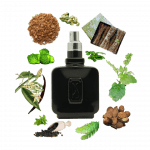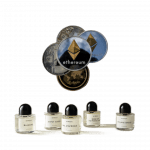Is Being Left Out in the Cold Bad for Perfume?

A month and a half ago I was waiting anxiously on a little box of samples in the mail. It was days before I had planned to travel for Thanksgiving, and I was nervous that the little box would have to be left behind in my tiny apartment mailbox in sub-freezing temperatures for more than a week.
And then what would happen? I mean, heat and direct sunlight can damage perfumes and colognes, right? So what about freezing cold temperatures?
It turns out I’m not the only one who’s had this thought. From time to time, this question floats across forums and message boards. A couple of weeks ago, I saw a Basenotes thread on the topic and decided to do a little research.
In the end, my little box of samples managed to miraculously arrive a day before I left, so my anxieties were for naught this time. But I did some research. Here’s what I found.
So, what can happen to perfume or cologne in the cold?
Consider the Melting Point
The melting point (or, in our case, freezing point) of any substance is the temperature at which it changes from solid to liquid, or the other way around. Not every material freezes at the same temperature as water. This means that sub-freezing temperatures outside don’t necessarily mean your perfume is frozen in your mailbox.
An alcohol-based fragrance, which is the most common base for perfumes and colognes, is unlikely to freeze entirely. Alcohol freezes at approximately -173.5°F (-114°C). So unless you live on Jupiter, your perfumes in the mailbox aren’t going to freeze over.
Now, if the fragrance in question is oil-based, that’s a bit trickier. Oil typically freezes at around 16°F (-9°C). That’s below the freezing point of water, 32°F (0°C), but not dramatically so. If you live in a place where it snows, you’re quite likely to have some days and weeks in winter that are cold enough to freeze oil.
The good news is that freezing and thawing oil generally doesn’t cause any irrevocable change. If your oil-based perfume has frozen, simply bring it inside and allow it to thaw at room temperature. Then, if you notice layers have separated, shake or swirl the bottle gently or roll it between your hands until the layers recombine.
Fractional Freezing
The thing is, even alcohol-based fragrances usually have some oil- (and even water-) based components in them, such as plant essential oils and absolutes. Just like a general oil base, these will freeze somewhere around 32°F (0°C).
This mixture of alcohol-, oil-, and water-based components can lead to something called fractional freezing. This is exactly what it sounds like. When different parts of a mixture freeze at different temperatures, it separates into layers as some of the parts freeze and some don’t.
Fractional freezing is actually frequently used in process engineering to separate substances with separate melting points. It’s also the process used to create fractionated cooking oils. Fractionated coconut oil, for instance, is liquid at room temperature, tasteless, and odorless. This is because the heavier layer of coconut oil, which also contains its flavor, is removed by freezing the oil until it separates.
Your perfume or cologne probably contains a number of components with different freezing points. As such, you may find that your fragrance has separated into layers after being left out in the cold. Since water, oil, and alcohol all have different freezing points, they split apart into layers.
Not to worry, though — this process is highly unlikely to cause any permanent damage. Just as is the case with oil-based perfumes, if you see fractional freezing in a fragrance bottle left out in the cold, bring it inside. Wait for it to thaw at room temperature.
Resist the temptation to try to speed this process up. Heat and direct sunlight are two things that can actually damage fragrance. Just let the bottle or vial sit until all of the layers are liquid again. Then, gently roll it between your hands, shake it, or swirl it until it looks like all of the layers have recombined.
What About Breakage?
Okay, so we know that cold weather probably won’t irrevocably change a fragrance. But what about the risk of breaking the vial?
I’m sure you’ve had the experience of accidentally freezing a container filled with water and having it crack. Intuitively, this seems like a concern about fragile glass bottles and vials of perfume as well. Not to worry, though: neither alcohol nor oil expand when they freeze, so they’re not going to force their containers to expand and break.
Water does expand when it freezes, but water-based components are a minority in most fragrance compositions.
Now, alcohol and oil bases have traditionally been the two main types of fragrance compositions. But lately, water-based perfumes have been cropping up online. Though there aren’t any large designers or brands hopping on the trend yet, some indie perfumers and specialty houses are now making water-based scents.
These are the only fragrances I’d really worry about leaving out in the cold. An alcohol- or oil-based perfume or cologne won’t expand when frozen, but a water-based one will, which is likely to shatter the glass bottle or vial that contains it.
TL;DR: It’s Probably Fine
In short, getting left out in the freezing cold for a couple of hours or days probably won’t damage your perfumes, unless they’re water-based. Water-based fragrances are pretty uncommon and mostly made by companies that specialize in them and by some independent artists.
Most perfumes and colognes are based on either alcohol or oil. Alcohol won’t freeze in winter temperatures at all, and, while oil might, it won’t break the vial or cause any permanent damage to the fragrance.
Year-round, fragrance products are often left in cold planes, trucks, and warehouses for days at a time. Most of the time, they arrive in perfect condition and you’d never notice the difference. If you do see that a perfume or cologne has separated into layers, you can simply let it thaw and then shake or roll it to mix the layers back together. There shouldn’t be any permanent change.
So there’s one less thing to worry about when you’re buying perfume or cologne online. Stay warm and shop away!










One thought on “Is Being Left Out in the Cold Bad for Perfume?”